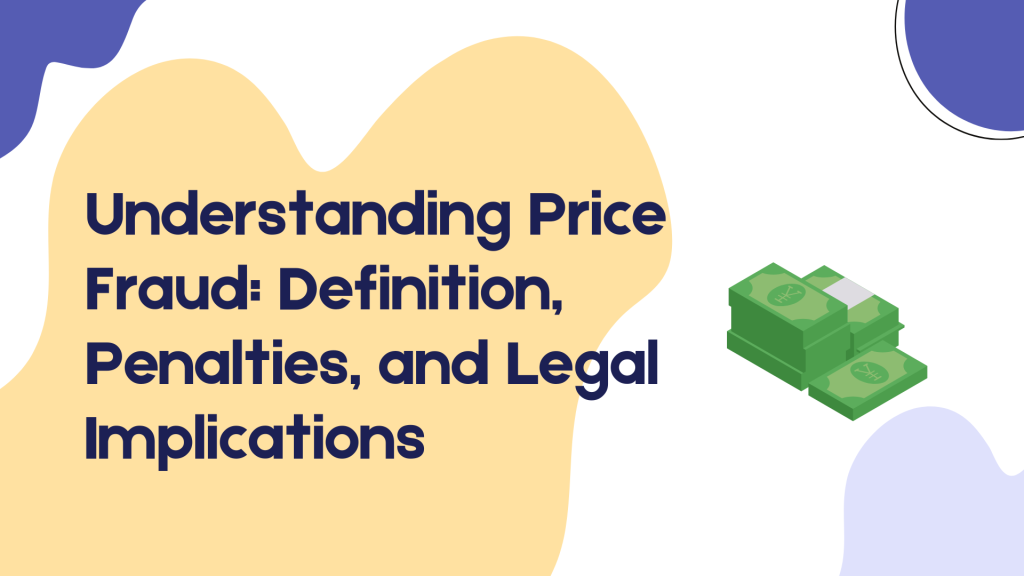
What is Price Fraud?
Price fraud is a deceptive practice where businesses intentionally manipulate prices, misrepresent product values, or use dishonest tactics to gain financial advantages over consumers. Although there is no explicit legal definition of “price fraud” in Vietnamese law, the Law on Price 2023 and Decree 87/2024/NĐ-CP outline prohibited acts in the field of pricing and appraisal.
According to Article 7, Clause 2 of the Law on Price 2023, price fraud occurs when businesses:
- Spread false or misleading information about the economic and social situation, causing market price disruptions.
- Intentionally alter agreed-upon transaction terms without prior notice to customers regarding factors such as time, location, purchase conditions, sales conditions, transportation methods, payment terms, quality, quantity, features, or functionality of goods and services at the time of delivery.
In essence, price fraud involves the deliberate modification of contractual obligations without notifying consumers, resulting in financial harm to buyers.
Penalties for Enterprises Engaging in Price Fraud
Price fraud is strictly prohibited under Vietnamese law, with significant penalties imposed on violators. Decree 87/2024/NĐ-CP specifies administrative fines for price fraud offenses as follows:
1. Fines for False or Misleading Information
A fine ranging from 15,000,000 VND to 20,000,000 VND is imposed on individuals who spread false or inaccurate information about economic and social conditions, leading to market disruptions and price distortions.
2. Fines for Direct Price Fraud
Individuals committing price fraud by intentionally altering contract terms without prior customer notification face fines ranging from 20,000,000 VND to 30,000,000 VND.
3. Fines for Enterprises
According to Article 3, Clause 4 of Decree 87/2024/NĐ-CP, the penalties imposed on organizations are double the amount applied to individuals. Consequently, businesses found guilty of price fraud may face fines ranging from 40,000,000 VND to 60,000,000 VND
Additional Consequences for Price Fraud
Aside from monetary fines, businesses involved in price fraud must undertake corrective measures, including:
- Refunding customers: Companies engaging in price fraud must return any unlawfully obtained funds to affected consumers.
- Public disclosure: Enterprises must issue a public announcement detailing the corrective actions taken within 30 days on mass media platforms.
- Government confiscation: If the affected customers cannot be identified or refuse reimbursement, the fraudulently acquired amount must be transferred to the state budget.
Statute of Limitations for Price Fraud Penalties
The timeframe for enforcing administrative penalties for price fraud is governed by Decree 87/2024/NĐ-CP and the Law on Handling Administrative Violations 2012.According to Article 6 of the Law on Handling Administrative Violations 2012, the general statute of limitations for administrative penalties is one year. However, exceptions apply to certain violations, including those related to pricing management, taxation, securities, and intellectual property, for which the statute of limitations extends to two years.
Key considerations for determining the statute of limitations include:
- If the price fraud violation has ended, the statute of limitations begins from the date the violation ceased.
- If the price fraud violation is ongoing, the statute of limitations begins from the date the violation is discovered.
Thus, under Vietnamese law, businesses involved in price fraud can be penalized for up to two years after the fraudulent act is identified.
Preventive Measures for Businesses
To avoid penalties and legal consequences, businesses must comply with price regulations and adopt transparent pricing practices. Key measures include:
- Clear Contractual Agreements: Ensure that all contractual terms related to pricing, payment, delivery, and product specifications are explicitly stated and agreed upon by both parties.
- Transparent Pricing Strategies: Avoid misleading price promotions, hidden fees, or price manipulation tactics that could mislead consumers.
- Regulatory Compliance: Regularly review and update business practices to align with Vietnam’s pricing regulations and consumer protection laws.
- Customer Communication: Provide clear and accurate information regarding pricing policies, ensuring that consumers are informed of any price changes in advance.
- Internal Monitoring: Implement internal compliance systems to detect and prevent potential pricing fraud within the organization.
Price fraud is a serious violation under Vietnamese law, with penalties reaching up to 60,000,000 VND for businesses found guilty of misleading consumers. Companies engaging in price fraud not only face financial fines but must also return illicit profits and publicly disclose their corrective actions. To ensure compliance, businesses should prioritize transparency, adhere to fair pricing practices, and stay updated on legal requirements to avoid costly legal repercussions.
______________________
Contact Our Legal Experts
At TLA, our experienced lawyers specialize in diverse legal fields, including criminal, civil, corporate, and family law. We provide comprehensive legal support and personalized advice.
For Expert Legal Consultation, Contact Us:
1. Lawyer Vu Thi Phuong Thanh – Director of TLA Law Firm, Hanoi Bar Association.
Email: vtpthanh@tlalaw.vn
2. Lawyer Tran My Le – Chairwoman of TLA Law Firm’s Members’ Council, Hanoi Bar Association.
Email: tmle@tlalaw.vn
Address: Floor 7, No. 6 Duong Dinh Nghe Street, Yen Hoa, Cau Giay, Hanoi
Website: https://tlalaw.vn/
Hotline: 0906246464
_LTTTra_

